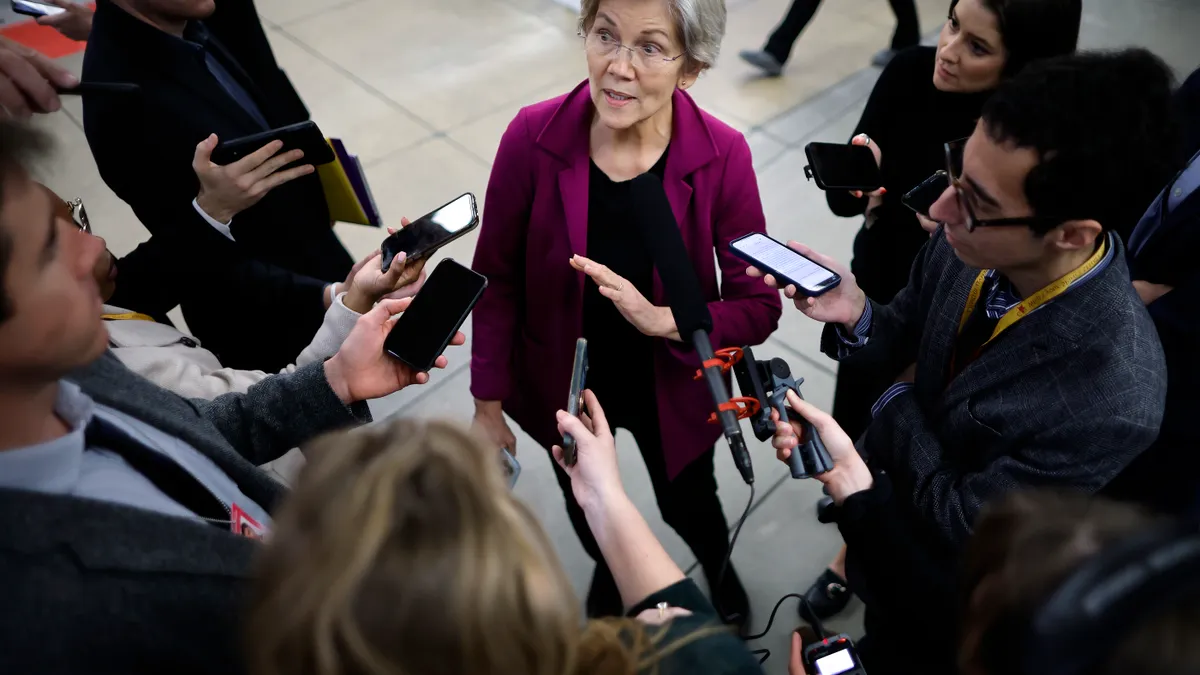Sen. Elizabeth Warren, D-MA, has drawn more support for a bill meant to crack down on the use of crypto in illegal activities, including money laundering, drug trafficking and sanctions evasion.
Alongside five new co-sponsors, including three fellow members of the Senate Banking Committee, and with support from organizations including the Bank Policy Institute, Warren laid out a bill Monday that would extend Bank Secrecy Act responsibilities, including know-your-customer requirements, to digital asset wallet providers, miners, validators and other network participants that may act to validate, secure or facilitate crypto transactions.
The Digital Asset Anti-Money Laundering Act, introduced this summer, now has the backing of Sens. Raphael Warnock, D-GA; Laphonza Butler, D-CA; Chris Van Hollen, D-MD; John Hickenlooper, D-CO, and Ben Ray Luján, D-NM, who joined the bill as cosponsors, according to Monday’s announcement.
“The Treasury Department is making clear that we need new laws to crack down on crypto’s use in enabling terrorist groups, rogue nations, drug lords, ransomware gangs, and fraudsters to launder billions in stolen funds, evade sanctions, fund illegal weapons programs, and profit from devastating cyberattacks,” Warren said in a prepared statement.
She called the bipartisan bill “the toughest proposal on the table cracking down on crypto’s illicit use and giving regulators more tools in their toolbox.”
The bill would force Americans buying or selling more than $10,000 in digital assets through offshore accounts to file a report of foreign bank and financial accounts with the Internal Revenue Service.
Additionally, it would require the Treasury Department to create an anti-money laundering and counterterrorism financing compliance examination and review process for money service businesses and other digital asset entities with BSA obligations; and would require the Securities and Exchange Commission and Commodity Futures Trading Commission to establish a similar compliance examination and review processes for the entities they regulate.
Surprise ally
The development comes after last week’s Senate hearing for big bank CEOs, during which Warren found a moment of allyship with JPMorgan Chase CEO Jamie Dimon, who said he’s “always been deeply opposed to” crypto, and that if he was the government, he would “close it down.”
“The only true use case for it is criminals, drug traffickers, anti-money laundering, tax avoidance … because it is somewhat anonymous … and because it doesn’t go through all these systems built over many years — know your customer, sanctions, OFAC, they can bypass all of that,” Dimon said.
He made his statements in response to Warren, who listed several illicit ways crypto has allegedly been used of late: North Korea has funded its nuclear program in part “using the proceeds of crypto crime, and … Hamas received millions of dollars through crypto transactions including ‘large sums from Iran.’”
It was a rare moment of common ground between the lawmaker and the CEO, who have many times been at odds. Warren blasted JPMorgan’s acquisition of the failing First Republic Bank this year, calling the deal a “troubling outcome, leaving me with numerous questions.”
Dimon has long been a vocal opponent of crypto. In 2014, he told CNBC that Bitcoin was “a terrible store of value [that] doesn’t have the standing of the government.” Three years later, Bloomberg reported that Dimon called investment in crypto “worse than tulip bulbs” — a reference to the 17th-century Dutch tulip market bubble, when tulip bulbs surged to out-of-this-world prices — and said that if a JPMorgan employee began trading Bitcoin, he’d “fire them in a second. For two reasons: It’s against our rules, and they’re stupid. And both are dangerous.”
In January, he said crypto was a “complete sideshow,” likening crypto tokens to “pet rocks” in a CNBC interview.
He has, at the same time, shown support for the use of blockchain technology: “[It’s] good technology. We actually use it. It will be useful in a lot of different things. God bless the blockchain,” he told CNBC in 2017. And despite his repeated criticism of crypto investments, a small but steady stream of news tying his bank to digital assets has emerged in recent history.
Blockchain is the foundation for JPM Coin, JPMorgan’s stablecoin launched in 2019 for institution-to-institution payments.
In October 2022, JPMorgan hired Celsius’ former head of regulatory affairs, Aaron Iovine, as the bank’s executive director of digital assets regulatory policy, according to Iovine’s personal LinkedIn.
A month later, the U.S. Patent and Trademark Office approved a trademark for “J.P. Morgan Wallet,” indicating that the nation’s biggest bank could provide electronic transfer of virtual currencies for members of an online community to use, cryptocurrency payment processing, virtual checking accounts and payment settlement between parties, among other features.
Last month, the bank rolled out a programmable payment feature for JPM Coin users, allowing them to specify “if-then-then-that” rules to automatically trigger payments based on customizable criteria. Umar Farooq, the company’s global head of financial institution payments, told Bloomberg soon after that JPM Coin could be handling $10 billion in transactions daily within two years.
Other perspectives
While Dimon’s opinion has held consistent, other financial industry hotshots have changed their tune on crypto — most notably Larry Fink, who runs the world’s largest asset manager.
In 2017, the BlackRock CEO called Bitcoin an “index of money laundering” at an Institute of International Finance meeting and said Bitcoin “just shows you how much demand for money laundering there is in the world. That’s all it is.”
In 2021, he told CNBC he was “more in the Jamie Dimon camp” on Bitcoin, which at the time was $10,000 short of its all-time-high value.
But in June — following the 18-month-plus crypto winter that befell the industry months after his aforementioned comments, which saw trillions of dollars in value fall out of the crypto market and several high-profile crypto firm bankruptcies — BlackRock filed with the SEC to form a spot Bitcoin exchange-traded fund. And in November, the firm filed to form a spot Ethereum ETF, further deepening its crypto push.
Since filing for the spot Bitcoin ETF, Fink has been vocal on his now-bullish stance on crypto.
“It has a differentiating value versus other asset classes, but more importantly, because it’s so international it’s going to transcend any one currency,” Fink said to CNBC in July.
“We believe we have a responsibility to democratize investing. We’ve done a great job, and the role of ETFs in the world is transforming investing,” he said at the time. “And we’re only at the beginning of that.”
The crypto market has experienced gains in recent months, in spite of former FTX CEO Sam Bankman-Fried’s fraud convictions and former Binance CEO Changpeng Zhao’s guilty plea on anti-money laundering law violations. Bitcoin has been valued above $40,000 since Dec. 4. In November 2022, it hit a multiyear low of $15,787.53.






















